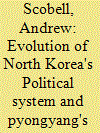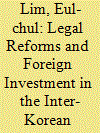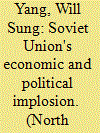|
|
|
Sort Order |
|
|
|
Items / Page
|
|
|
|
|
|
|
| Srl | Item |
| 1 |
ID:
081306


|
|
|
|
|
| Publication |
2008.
|
| Summary/Abstract |
Since the formal establishment of the Democratic People's Republic of Korea (DPRK) in 1948, the Korean Peninsula has witnessed regular crises, repeated tensions, and occasional attempts at negotiation and conflict management. Most scholars and analysts seek to explain this record with reference to balance-of-power dynamics between the two Koreas, with particular attention to the evolving alliance and adversarial relationships of Pyongyang and Seoul, to explain the past five decades of Korean history. Perhaps equally important in comprehending the Korean conundrum is to understand the internal dynamics in the countries concerned over the past half century. This paper examines the historical evolution of the DPRK's political system to analyze what, if any, impact domestic political realities have had on that country's potential to pursue conflict management on the Korean Peninsula.
|
|
|
|
|
|
|
|
|
|
|
|
|
|
|
|
| 2 |
ID:
081303


|
|
|
|
|
| Publication |
2008.
|
| Summary/Abstract |
On July 30, 2007, trade officials of the United States and South Korea signed the Korea-U.S. Free Trade Agreement (KORUS FTA). This paper will review the influences of the KORUS FTA on intra-Korean relations, while considering negative and positive perspectives on the FTA in the process of analysis. This paper has been organized into two parts. The first part is focused on the characteristics of intra-Korean relations. The second part is focused on the influence of the KORUS FTA on intra-Korean relations.
One important issue for Korea and a politically sensitive issue for the U.S. was the status of goods from the Kaesong Industrial Complex (KIC) in North Korea. The KIC, part of South Korea's engagement strategy with North Korea hosts South Korean companies that use North Korean labor. While rejecting Korea's request that goods from the KIC enter the U.S. duty free, both sides agreed to create a "Committee on Outward Processing Zones (OPZs)" on the Korean Peninsula that would consider such ventures at a later date. This means that the United States wants to have control, to slow down the speed of intra-Korean economic cooperation.
|
|
|
|
|
|
|
|
|
|
|
|
|
|
|
|
| 3 |
ID:
081305


|
|
|
|
|
| Publication |
2008.
|
| Summary/Abstract |
In the summer of 2007, North Korea's decision to abandon its nuclear weapons program in accordance with the September 19 joint statement (2005) and the February 13 agreement (2007) aroused hopes that the denuclearization of the Korean Peninsula would at last become a reality. Such an expectation was strengthened by North Korea's actual suspension of the operation of its Yongbyon nuclear facilities in July 2007 and also by its commitment to disable these facilities by the end of 2007. The breakthrough in the denuclearization of North Korea has been possible as a result of concerted diplomatic efforts on the part of the powers involved in a series of the six-party talks in Beijing from 2003 to 2007.
As a part of the overall settlement of the North Korean nuclear issue, the six powers have pledged in these agreements to bring about diplomatic normalization between Japan and North Korea on the basis of the Pyongyang Declaration of 2002. Thus, the normalization of Japanese-North Korean relations is no longer a bilateral issue for Tokyo and Pyongyang, but also an important matter of concern for major powers in the region, nations which have signed the agreements of 2005 and 2007 at the six-party talks in Beijing.
This article examines Japanese-North Korean relations with an emphasis on the analysis of major issues involved in this bilateral relationship. Since we have already published papers analyzing Japanese-North Korean relations preceding the 2004 Pyongyang summit elsewhere,1 our focus of this paper will be on the post-2004 developments in Tokyo-Pyongyang relations. As will be shown, the inability of the two neighboring countries to normalize diplomatic relations so far can be ascribed largely to Pyongyang's unwillingness to abandon its nuclear weapons program and, to a lesser degree, to its clumsy handling of the abduction issue and to Japan's inflexibility and unwillingness to compromise on the abduction issue. Now that Pyongyang has agreed to abandon its nuclear weapons program, the question remains as to whether or not the two neighboring countries can settle the abduction issue and normalize diplomatic relations when Pyongyang disables its nuclear facilities.
|
|
|
|
|
|
|
|
|
|
|
|
|
|
|
|
| 4 |
ID:
081302


|
|
|
|
|
| Publication |
2008.
|
| Summary/Abstract |
This paper briefly examines the current status of efforts to promote the Kaesong Industrial Complex (KIC) and analyzes the significance of attracting foreign businesses to the complex. Attention is focused especially on the meaning and limitations of legal reform to attract foreign investment, and the direction in which it should head. The international community has undeniable influence over the tasks of the KIC and its legislative reform. For that reason, this paper offers a view of the KIC from the perspective of the United States and the international community, focusing on the KIC's legislative infrastructure
|
|
|
|
|
|
|
|
|
|
|
|
|
|
|
|
| 5 |
ID:
081307


|
|
|
|
|
| Publication |
2008.
|
| Summary/Abstract |
This paper examines the outlook of North Korea's economic and political future. It argues that North Korea will most likely demise the same way as the Soviet Union. That is, an economic implosion will occur causing the political collapse of North Korea. Contrary to popular belief that North Korea will sustain itself if it reforms its economic policies, this paper argues that regardless of reform, North Korea will not be able to avoid the collapse of the state and the Kim regime for that matter. The only impact reform will have is in regards to time as it will merely delay the process of North Korea's collapse. The author wishes to stress that this assessment of North Korea's future will likely show its greater impacts after Kim Jong Il has passed. It is unlikely that North Korea or the regime will collapse under Kim Jong Il's reign because his regime still has a strong authoritative grip over his state, which he controls by being the commander of the North Korean People's Army and various paramilitary apparatuses, and by control of the media. However, the decisions that Kim Jong Il makes now will be the indirect cause of various unintended impacts in the future.
|
|
|
|
|
|
|
|
|
|
|
|
|
|
|
|
| 6 |
ID:
081301


|
|
|
|
|
| Publication |
2008.
|
| Summary/Abstract |
This paper aims to present a clear discussion of the history of U.S. sanctions against the Democratic People's Republic of Korea (DPRK) in order to place current and future measures in context. A brief review of phases in the U.S. economic policy toward the DPRK is followed by a longer section tracking the major changes in U.S. sanctions against North Korea over the past six decades. The paper concludes with a summary of U.S. sanctions against North Korea from 2000 until June 2007, and a timeline listing major events in U.S.-DPRK relations and the imposition and relaxing of U.S. sanctions.
This paper was written as economic sanctions against North Korea were a prominent bilateral bargaining chip in the multilateral effort to end North Korea's nuclear weapons programs. The February 13, 2007, "Initial Actions for the Implementation of the Joint Statement" declares that the United States will "begin the process" of removing North Korea from the "State Sponsors of Terrorism" list as well as "advance the process" of changing the DPRK's status under the Trading with the Enemy Act and subsequent laws that replaced that Act. News reports following the October 3, 2007, release of the "Second-Phase Actions for the Implementation of the Joint Statement" indicate that the removal from the terrorism list could come by the end of 2007. There is likely to be public debate in the United States about whether North Korean actions have been sufficient to warrant these changes to its status, particularly if it is confirmed that North Korea was aiding Syria in the development of a nuclear weapons program
|
|
|
|
|
|
|
|
|
|
|
|
|
|
|
|
| 7 |
ID:
081304


|
|
|
|
|
| Publication |
2008.
|
| Summary/Abstract |
A growing body of literature indicates that the balance of power may shift from the West to the East as China rises and the United States declines. The sum total of America's global interests and obligations is nowadays far larger than the country's power to defend them all simultaneously. In this respect, the problems the United States confronts are almost identical with those of previous imperial powers, such as Britain, France, Spain, and the Soviet Union. If we accept an American decline for a moment, China is the only country that has the economic potential to challenge the United States for the global economic leadership in the next generation. There have been two great shifts in global power over the past 400 years. The first was the rise of Europe, which around the 17th century became the richest, most enterprising, and ambitious part of the world. The second was the rise of the United States in the late 19th and early 20th centuries, when it became the single most powerful country in the world, the globe's decisive player in economics and politics. For centuries, the rest of the world was a stage for the ambitions and interests of the West's great powers. China's rise, along with those of Japan and Korea, represents the third great shift in global power, the rise of East Asia.1 They used to say that when America sneezes, the rest of the world catches pneumonia. Some analysts say that this old adage no longer is true, because a great shift in economic power is taking place from a single dominant influence of the United States to a bipolar system driven by the United States and China. However, this paper argues why the United States will continue to maintain the world's economic leadership in the next generation and beyond. In addition, it discusses the importance of multilateral actions on world affairs with respect to the North Korean nuclear standoff.
|
|
|
|
|
|
|
|
|
|
|
|
|
|
|
|
|
|
|
|
|